| Srl | Item |
| 1 |
ID:
130554
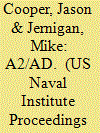

|
|
|
| 2 |
ID:
119129
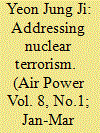

|
|
|
| 3 |
ID:
121997


|
|
|
| 4 |
ID:
113160


|
|
|
|
|
| Publication |
2012.
|
| Summary/Abstract |
The announcement of a reformed US defence strategy by President Barack Obama and Secretary of Defense Leon Panetta in early January 2012 confirmed a pivot towards the Asia-Pacific as commitments to war fighting in the Middle East and Central Asia subside. Obama, Panetta and General Martin Dempsey, the chairman of the Joint Chiefs of Staff, briefed reporters on 5 January on America's new strategic guidance document, 'Sustaining US Leadership: Priorities for 21st Century Defense'. The product of a review of US defence priorities 'at a moment of transition' for the nation, the document notes that the United States will 'of necessity rebalance toward the Asia-Pacific region'. The principle of the Asia pivot was also signalled by Secretary of State Hillary Clinton in a November 2011 Foreign Policy article in which she noted that 'one of the most important tasks of American statecraft over the next decade will … be to lock in a substantially increased investment - diplomatic, economic, strategic, and otherwise - in the Asia-Pacific region'.
|
|
|
|
|
|
|
|
|
|
|
|
|
|
|
|
| 5 |
ID:
110926


|
|
|
|
|
| Publication |
2012.
|
| Summary/Abstract |
Last August, the Republican presidential contender Mitt Romney performed what has become a quadrennial rite of passage in American presidential politics: he delivered a speech to the annual convention of the Veterans of Foreign Wars. His message was rooted in another grand American tradition: hyping foreign threats to the United States. It is "wishful thinking," Romney declared, "that the world is becoming a safer place. The opposite is true. Consider simply the jihadists, a near-nuclear Iran, a turbulent Middle East, an unstable Pakistan, a delusional North Korea, an assertive Russia, and an emerging global power called China. No, the world is not becoming safer."
|
|
|
|
|
|
|
|
|
|
|
|
|
|
|
|
| 6 |
ID:
106709
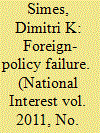

|
|
|
| 7 |
ID:
128787


|
|
|
| 8 |
ID:
128798


|
|
|
| 9 |
ID:
118887


|
|
|
| 10 |
ID:
113164
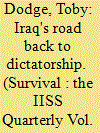

|
|
|
|
|
| Publication |
2012.
|
| Summary/Abstract |
On 15 December 2011, in a fortified compound at Baghdad International Airport, US Secretary of Defense Leon Panetta oversaw the formal end of America's military presence in Iraq. The event marked the final departure of US troops, eight years and nine months after the invasion. Panetta's farewell speech was sober and downbeat. He placed a great deal of emphasis on the sacrifices that Iraqis and Americans had made. However, given that the George W. Bush administration had placed the political and economic transformation of Iraq at the centre of its war aims, Panetta's description of what the mission had ultimately achieved was decidedly modest. Iraq, he said, could now govern and secure itself … the Iraqi army and police have been rebuilt and they are capable of responding to threats; violence levels are down; al Qaeda has been weakened; the rule of law has been strengthened; educational opportunities have been expanded; and economic growth is expanding.
|
|
|
|
|
|
|
|
|
|
|
|
|
|
|
|
| 11 |
ID:
119016


|
|
|
| 12 |
ID:
115806


|
|
|
| 13 |
ID:
110598
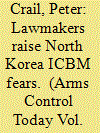

|
|
|
|
|
| Publication |
2012.
|
| Summary/Abstract |
Five Republican members of Congress raised concerns in November that North Korea is developing a road-mobile intercontinental ballistic missile (ICBM), a capability that might allow it to protect its long-range missiles from being destroyed before they are used. However, some nongovernmental experts said such a system was very likely beyond North Korea's current technical reach.
|
|
|
|
|
|
|
|
|
|
|
|
|
|
|
|
| 14 |
ID:
110156


|
|
|
|
|
| Publication |
2012.
|
| Summary/Abstract |
America's military has proven incredibly effective and adaptive to the threats of the 9/11 era. It has not, however, been particularly cost-conscious. Insolvency is our gravest national security threat, and - thankfully - the Congress has finally gotten serious about dealing with it. Defense is in for a decade of austerity, of a magnitude that cannot be accommodated within current strategy and forces. Much higher risk will need to be accepted in how we fight our wars and address threats of lesser magnitude or longer lead times unless we find more innovative approaches. Foregoing counterinsurgencies, simplifying our war aims, protecting our advantages in creativity, restructuring military benefits, shifting greater responsibility to allies and emphasizing cost-exchange ratios in our operations will be necessary. It is a daunting list, and wearying to a military that has shouldered the burdens of wars for a decade with little contribution from our broader society. But it, or something like it, will also be necessary to redress the dangerous vulnerability or our debt.
Historian Arnold Toyenbee said that empires die by suicide, not homicide. Our country has been on a path to suicide by spending profligacy and it has resulted in a debt problem of enormous magnitude. This is our main strategic vulnerability, and our capacity to solve it will likely be the crucial test of whether American hegemony is perpetuated through the twenty-first century, or we have begun to decline.
Our country is facing a margin call. We have used borrowed money to purchase assets. Those assets are both discretionary (defense and other annual spending) and non-discretionary (entitlement payments and promises). External markets and internal regulators-in the form of the American electorate-have called into question whether we have the money to pay for the assets we have purchased. Receiving a margin call, the investor must either increase the amount of money on deposit or sell off assets.
Faced with difficult choices, the United States has two enormous advantages. First, Americans have acknowledged the problem and are engaged in an extended and boisterous debate on how to solve it. Second, U.S. military dominance is so substantial that we can absorb near-term risk of significant defense spending cuts in order to solve the larger strategic problem of our national indebtedness.
The coming cuts in defense will necessitate the first serious reconsideration in the 9/11 era of the strategy and requirements for U.S. military forces. The Department of Defense (DOD) is in the process of determining where to pare for the $450 billion in cuts that constitute the first phase of the budget reductions; the more vexing question is how DOD would accommodate the additional $600-800 billion that would come with sequestration or a second phase "super committee" agreement.
To operate within the constraints of such austerity, we will have to fight differently. The size of our forces will shrink further, even though they are already too small. We will not be able to sustain personnel-intensive wars like counterinsurgencies. The operational approaches available at lesser cost have daunting endogenous effects on our military and exogenous effects on the societies in territories where we will apply military force. We will become more reliant on reconstitution, extending the timelines beyond what we have come to take for granted as immediate availability of forces and rapid execution of war plans.
We may also need to forego important recalibrations, like allowing the Marine Corps to differentiate itself from the Army and refocus on amphibious operations, and the long overdue returning of the national guard and reserve to their traditional roles. Spending in other national security agencies-on which current war strategies rely-is almost certain to be reduced even more than in DOD, calling into question our ability to conduct "whole of government" operations. These developments w
|
|
|
|
|
|
|
|
|
|
|
|
|
|
|
|
| 15 |
ID:
115595
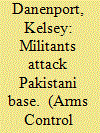

|
|
|
| 16 |
ID:
108635
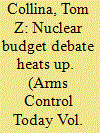

|
|
|
|
|
| Publication |
2011.
|
| Summary/Abstract |
As the congressional "super committee" prepares its recommendations for reducing the federal deficit by at least $1.2 trillion over 10 years, Congress is beginning to grapple with the question of how much, if at all, to reduce spending on U.S. nuclear weapons.
|
|
|
|
|
|
|
|
|
|
|
|
|
|
|
|
| 17 |
ID:
113151


|
|
|
| 18 |
ID:
115869


|
|
|
| 19 |
ID:
097837
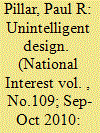

|
|
|
|
|
| Publication |
2010.
|
| Summary/Abstract |
THE POST of director of national intelligence (DNI) has had an unhappy five-year history. Until now it has been easier to blame the successive occupants of the position than to acknowledge the fundamental flaws of the office. Much commentary about the recent ouster of Dennis Blair, for example, has focused on his lack of chemistry with the president, his riling of the Israel lobby by attempting to appoint Chas Freeman to head the National Intelligence Council and a deficiency in political street-fighting skills compared to those of CIA Director Leon Panetta. All those no doubt contributed to Blair's troubles. But one indication that the principal problems are those of the office rather than the occupant is that the job, in such a short time, has now chewed up three able public servants, each of whom excelled in their principal professions (the diplomatic service in the case of the first DNI, John Negroponte, and the military in the cases of Blair and his predecessor, Mike McConnell). More telling still is the difficulty in persuading other able people to take the job. Reportedly, the first to refuse was the future secretary of defense, Robert Gates, one of the most adept officials in Washington at protecting his own reputation; he can certainly recognize a losing hand when he sees one.
|
|
|
|
|
|
|
|
|
|
|
|
|
|
|
|
| 20 |
ID:
119764
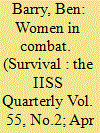

|
|
|